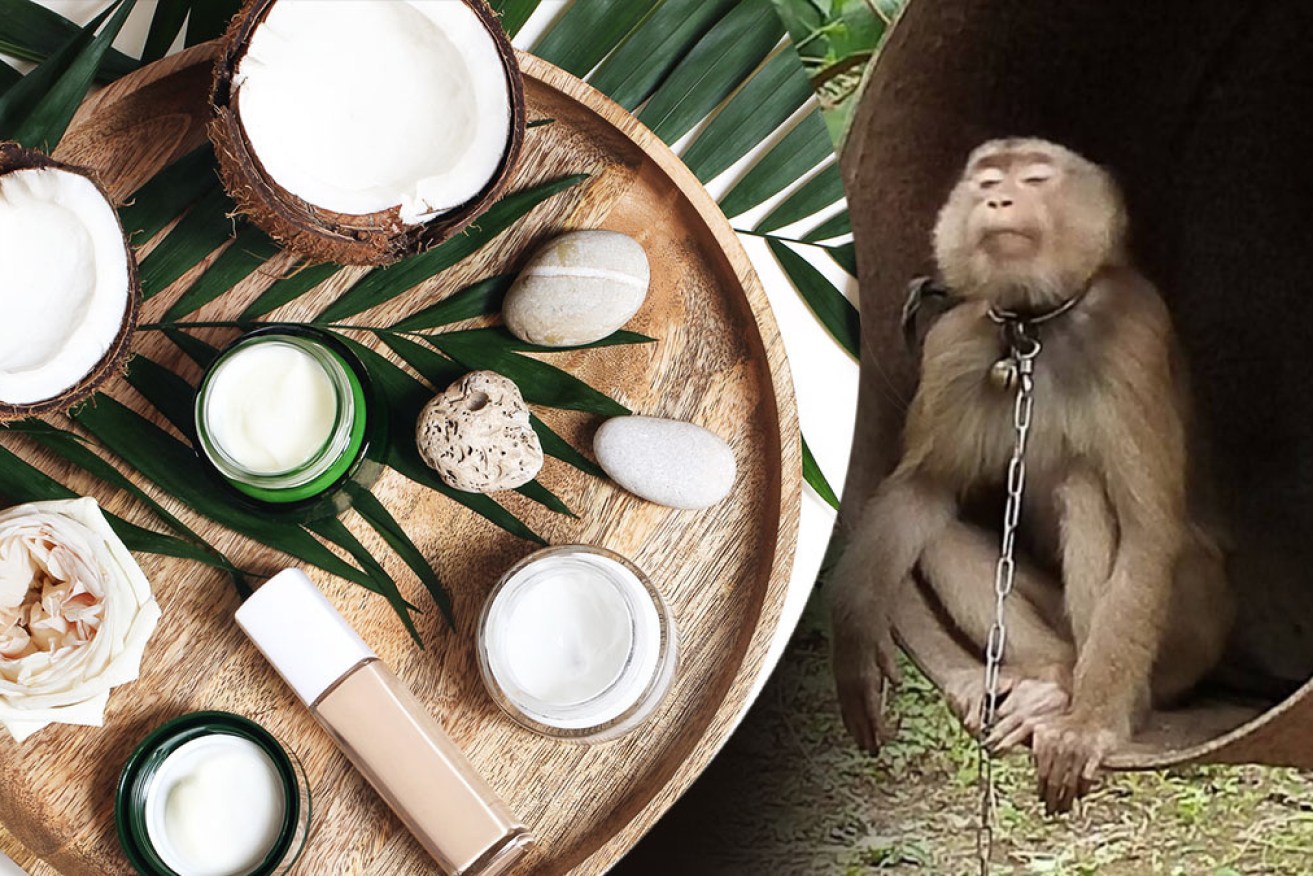Monkey labour: The terrible truth about the coconut products we love to buy


The hidden cost of hard labour and exploitation behind your favourite coconut products. Photo: PETA / Getty / TND
Supermarket chains in Australia and around the world are distancing themselves from products that are made using monkey labour.
Coconut-based products exported from Thailand are being dropped from a number of mainstream Western retailers amid outrage over the exploitation of pigtail macaque monkeys.
Brands at the centre of the scandal include Chaokoh and Aroy-D, both of which are sold in Australia.
In the United States, supermarket chain Walgreens, which operates more than 9000 stores across the country, has stopped stocking products confirmed to use monkey labour, while UK health and beauty retailer Boots has pulled blacklisted brands from shelves in 2758 stores.
An exposé of monkey labour by People for the Ethical Treatment of Animals (PETA) found the monkeys are illegally captured as babies and forced to climb trees to collect up to 1000 coconuts for export everyday.

Pigtail macaque monkeys are social animals but are kept in isolation on Thai coconut fairs. Photo: PETA
When they are not working, the monkeys are kept chained in filthy conditions or confined to small cages, often in solitude, and many displayed stereotypical repetitive behaviours indicating they were under extreme stress.
Some trainers also allegedly use the monkeys in circus-style shows in order to earn an extra profit on the side.
Brooke Aldrich from Animals Asia said the monkeys are likely living miserable lives and would not have their needs met in the conditions of forced labour.
“Pigtailed macaques (like all monkeys) are wild animals, and even the most ‘loving’ treatment on the part of the owner/trainer cannot make up for the fact that when kept as labourers (or as pets or performers) their innate biological needs are incredibly difficult – maybe impossible – to meet,” Ms Aldrich told The New Daily.
“Pigtailed macaques normally live in groups of maybe 25 individuals – although this number can vary and sometimes be much higher.
“They’re hard-wired to live their lives in these really complex social groups – multigenerational, dominance hierarchies, drama, joy, friendships, the whole deal.
“When they’re deprived of this they suffer immensely – it’s as important to them as their need to travel freely with these groups through the forests they inhabit, to forage for the great variety of foods that they’ve evolved to rely on” she said.
Carrie Symonds, UK Prime Minister Boris Johnson’s fiancé, joined the fight on Twitter against monkey labour by calling out a number of major UK supermarket chains.
“Please tell us you’re NOT selling any products that use monkey slave labour” Symonds tweeted.
I’ve just been sent this appalling video of a Thai monkey farm. Come on @asda, @Tesco and @sainsburys: Please tell us you’re NOT selling any products that use monkey slave labour https://t.co/H1rfbKbWYS
— Carrie Johnson (@carrielbjohnson) July 3, 2020
Two major brands, Chaokoh and Aroy-D, were identified as receiving the lion’s share of coconuts sourced from monkey labour, but it is speculated that many other brands may be profiting further along the supply chain.
The PETA investigation found the only way to ensure consumers are not supporting monkey labour is to boycott all Thai coconut products that do not list firm policies on the use of monkey labour.
Chaokoh and Aroy-D are not currently stocked at major Australian supermarkets, and a Coles spokesperson said the supermarket giant was in the process of investigating its other products.
“Coles-branded Coconut Cream and Coconut Water products are not produced from coconuts that are harvested with the use of monkeys,” the spokesperson said.
“Coles is currently investigating the status of the other coconut milk brands that are sold in our stores.
“Under their Terms of Trade with Coles, proprietary brand suppliers agree to uphold the Coles Group Ethical Sourcing Policy and manage animal welfare risks in their supply chains.”
A spokesperson for Woolworths said its suppliers denied the use of monkey labour in their supply chains.
“At Woolworths, animal welfare standards are fundamental to our customers, suppliers and business and we treat any allegations of mistreatment seriously,” the spokesperson said.
“We have been given assurances from our coconut suppliers that they don’t engage in these practices within their supply chains.”

The PETA investigation highlights the squalid conditions monkeys are kept in. Photo: PETA
Monkey business is booming…
According to The Los Angeles Times, Thailand’s commerce minister, Mr Jurin Laksanawisit, said supermarkets that sever ties with the Thai coconut industry are costing the country millions of dollars.
Thailand exported $USD395 million ($AUD569 million) worth of coconut milk in 2019 alone.

Monkeys are forced to wear metal collars and are kept tethered to the trees. Photo: PETA
Despite the lucrative industry, Mr Laksanawisit said the coconut-picking monkeys were mostly a tourist attraction and weren’t in danger.
“There is a difference between coconut harvesting using monkeys because of tradition or for tourism, and coconut harvesting on an industrial scale,” Mr Laksanawisit said.
“It is not profitable to use monkeys at the industry level. They have tools and methods to pick coconuts that are efficient and more profitable.”









